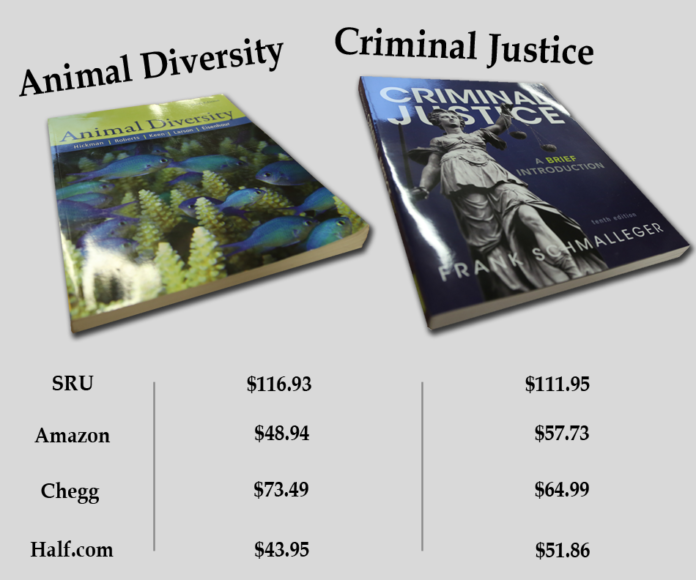The price of textbooks at the SGA Bookstore have been a controversial topic at SRU for awhile, but students should start to see prices decrease starting next semester due to a new software program that is designed to lower textbook costs.
Joe Flynn, SGA Bookstore manager, said he’s aware of the textbook rental websites, primarily Amazon Marketplace. He said the bookstore recently purchased a new software programmed named Verba, which allows the bookstore staff to reach out and source textbooks for lower prices. He said this is a new process that students should start seeing in the bookstore starting in the fall semester.
“Books that we are sourcing from Amazon or Half.com allows us to capture those books, bring them in at a cheaper price and pass the savings onto the customers,” he said.
Flynn said the price of textbooks is based on the industry average. It also depends on whether the book is new, used or if the book is a course package. There are also several books available digitally. Flynn said about 30 percent of the bookstore’s textbooks are digital. Although online textbooks seem to be cheaper, Flynn said there are some limitations to ordering digital textbooks.
“You’ll have that book for usually six months, it varies by each vendor, but a lot of times the digital book goes away after the class ends,” Flynn said. “We found that when we offer a digital book as well as a traditional book, 80 percent of students still prefer the hard copy book.”
Wendy Leitera, SRSRA Inc. Business Manager said a task force has formed with the goal of lowering textbook costs at the bookstore. She said faculty and staff, along with the provost got together to discuss ways to keep costs down.
“We’re all trying to work together to make textbook prices as low as possible,” Leitera said. “It’s not the faculty or the bookstore’s fault.”
Leitera said that often times, professors request the newest editions of books, but urges faculty not to order the newest edition if it’s not needed. She also said the more used books the bookstore receives at the end of the semester, the more used books will be given back to students, which will also lower the cost of textbooks.
If professors could find open sources where students could access the class materials for free, Leitera said that would be wonderful. She sad there are other different ways that the bookstore offers textbooks. Textbook rentals and digital rentals tend to be the cheapest, Leitera said.
Dr. Christy Crute, professor of mathematics, said she doesn’t use a textbook for her mathematics as a liberal art class because she wanted to experiment to see if she could develop a curriculum that works for her students, but she believes that textbooks are well worth purchasing.
“I think sometimes you guys should buy the textbooks and you might even want to retain it, but other times, I think it’s hard because you buy a fair amount of books that you’re just going to turn around and sell,” she said.
Taylor Dixon, junior exercise science major, said she buys half of her books from eBay and half from the bookstore, but she ultimately looks for which books are cheaper.
She said some of the books from the bookstore are outrageously priced.
“The most expensive book I’ve ever bought from the bookstore was my Chemistry II book, which was like $200,” Dixon said. “I almost bought an anatomy book for $400, but I ended up buying used.”
Dixon also said she tried to sell her book back to the bookstore once, but the bookstore claimed it was too damaged to buy back from her.
“I feel like the books have to be perfect for the bookstore to buy them back,” Dixon said.
Flynn said the bookstore buys books back all the time, but they have a big buyback event at the end each semester where they bring a wholesaler to purchase the textbooks. Flynn said there are two different styles of textbooks that the university repurchases. There are books that professors adopt to use next semester. If a student is selling a book that was adopted by a professor, the bookstore will pay a lot more money for that certain textbook because they will use it again next semester, Flynn said. If a book doesn’t get adopted by a professor, it goes to the wholesaler and they buy it at a lower price, he said. Flynn said this is where the student’s frustration comes in.
“I know there’s frustration,” Flynn said. “There’s frustration on our part too because two months later, we get an adoption from that professor saying, ‘hey, guess what, we’re going to use that book’, meanwhile we’ve already sold it back to the wholesale company. The student lost money because they could have gotten more money and we have to turn around and buy it from the wholesale company and pay the freight, when we could have bought it right from the student and pay them money. I think there’s that conception where we’re not paying much. We’re not paying much if we don’t know if we’re using that book next semester.”
Flynn said as of right now, only 50 percent of faculty have turned in their textbook adoptions for next semester. He said some faculty don’t turn in their adoptions because they don’t know what classes they’re teaching, some haven’t made their decision yet and some of them just haven’t taken the time to notify the bookstore.








